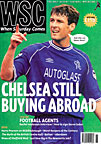 It seems that everyone in Britain thinks we have the hardest centre-halves. Matt Nation disagrees
It seems that everyone in Britain thinks we have the hardest centre-halves. Matt Nation disagrees
There appears to be a stipulation in certain player-turned-TV-pundits’ contracts which dictates that, at least twice a season, the audience must be told just how much one six-footer is looking forward to kicking lumps out of another six-footer in the game coming up on Saturday. Similarly, the pundits’ stooge is obliged to inform the camera just how much the fans will be looking forward to it as well. Their failure to use the phrase “Clash of the Titans” represents potential grounds for instant dismissal.
At first glance, the lads over 13 stone seem to relish the challenge of man-to-man combat: they chuck themselves about, snort, grimace, wince, bellow and do their utmost to cut the sort of figure that you need, rather than want, to be friends with. However, on closer scrutiny, it becomes clear that they only do it against the little guys, the Charles Hawtreys rather than the Bernard Bresslaws.
In short, they’re windy. As soon as they come up against lubbers of a similar size, they suffer, sweat-inducingly, sleep-deprivingly and pant-fillingly, from the fear of being found out. Since they’ve never been challenged, they have no idea whether they cut the mustard or not. Whether the jaw, normally square and jutting, shall turn out to be not so much glass as honeycombed. Or, when push comes to shove and square-up, whether they’ll faff their arms about like a cross between an effete darts player and a rising-five dressing themselves for the first time. Just look at the NatWest Building – it’s never been the same since Canary Wharf came along.
This rather groundless theory could be dismissed out of hand were it not for the predominant role played by the bloodied head-bandage. Until the tightening of hygiene regulations a few years back, every other game seemed to feature players – John Wile and Terry Butcher were the two most famous, but there were plenty of others – who insisted on carrying on despite their head looking like a Halloween pumpkin. What may have appeared on the surface as a sign of indomitability was really little more than expediency: there could be fewer more conspicuous strength-sappers than a headband which turns a deeper shade of crimson the longer the game goes on.
What’s more, if Larry Lloyd, Peter Withe, Brian Kilcline or whoever the opposition’s lump happened to be decided to stick (another) one on the sanguinary warrior, they would be branded cowards for ever more, their mothers would burst into tears of shame and the summons to a disrepute hearing would be on the doormat first thing Monday morning. It was an ideal cover-up.
In addition to most of them never having been gladiators themselves, the pundits have never been fans either. If they had, they would know that the only people interested in watching two languid great jessies bumping into each other committed mass suicide when It’s A Knockout was taken off. If we wanted to see cream-puffs being violent with each other on Saturdays, we would go to the local rugby ground, where “lighthouses of sinew”, “number fives burrowing away like a giant mole” and an array of similar phenomena described by Bill McLaren prove themselves to be bigger and clumsier than anything football has produced.
Of course, the big jessie in our team has acquired cult status. We love it when he has his back to goal and his opponents have to take a packed lunch and tell somebody where they’re going before they set off in search of the ball. We gasp in admiration when he shakes off his counterpart with the absent-minded facility of a chain-smoker flicking ash on to the floor, and we guffaw when dinky little refs show him a yellow card with all the trepidation of an under-age drinker at the bar for the first time.
But we love him only when he is unique. And we know he’s only one kick in the goolies away from losing the status that he didn’t want in the first place. As he bangs his head on the wall in the dressing room, we know he’s doing it not to psych himself up, but to try to put himself in hospital before the game starts. And we feel for him, we really do.
From WSC 153 November 1999. What was happening this month